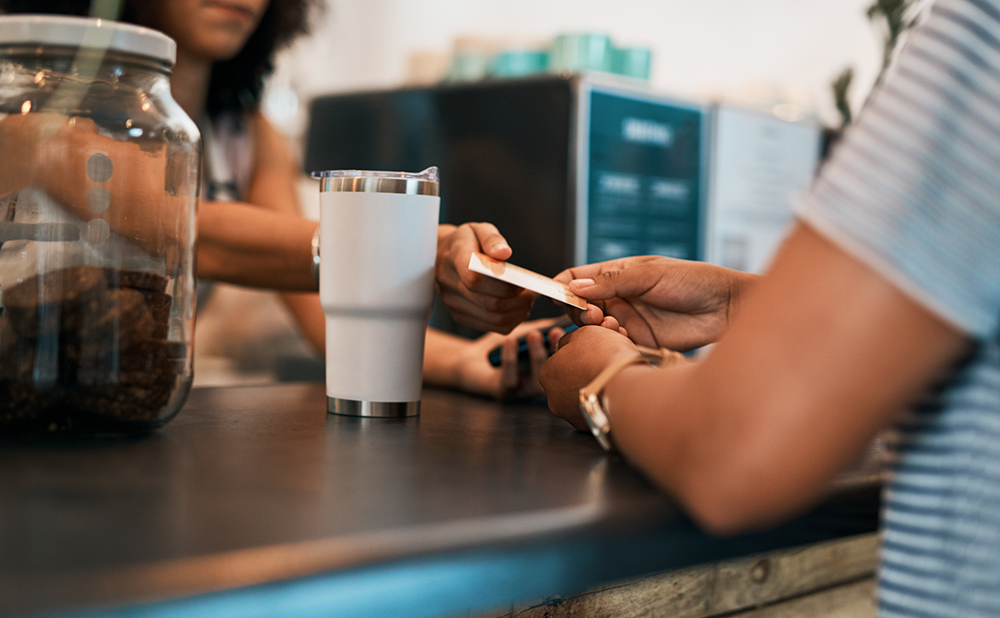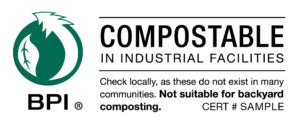On this page

Toolkit for businesses
Background information
In 2019, Guelph City Council directed staff to develop a strategy to eliminate or reduce single-use plastics (SUPs) as part of the Solid Waste Management Master Plan (SWMMP) process. Based on Council’s direction and based on the feedback we received during extensive community engagement, Council approved the single-use items (SUI) reduction strategy on April 25, 2022.
The purpose of this strategy is to encourage sustainable behavior among residents and implement procedural changes in businesses to decrease single-use item waste.
Since 2023, Guelph has banned:
- Single Use Plastic shopping bags, with some exemptions (listed in FAQ)
- Polystyrene foam cups and takeout containers
Effective March 1, 2025:
- Businesses must accept a customer’s clean reusable drink cup for beverage orders made in-store. (Exemptions apply to charitable or non-profit organizations, hospital or community care facilities, alcoholic beverages, and special events.)
- Businesses must only offer single-use accessory food ware items (e.g., utensils, stir sticks, condiments, and beverage trays) by request and/or at self-serve stations.
- Paper shopping bags must contain 40% post-consumer recycled content and clearly indicated in print on the bag.
Effective September 1, 2025:
Businesses must accept a customer’s clean reusable food container for food orders made in-store. (Exemptions apply to charitable or non-profit organizations, hospital or community care facilities, special events, and self-serve businesses like buffets, salad bars, and all-you-can-eat restaurants. An exemption applies to food-service businesses that have their own reusable-container policy outlining specific and limited conditions for accepting reusable-containers.)e cups and containers at food-service businesses.
Business requirements
Shopping bags
- Businesses must not provide a plastic shopping bag (including certified and non-certified compostable plastic shopping bags, and biodegradable shopping bags) unless it is designed and capable of being used 100 times and can be washed or disinfected.
- Businesses may provide reusable shopping bags or paper shopping bags with two reinforced handles to a customer, and they may charge a fee.
- Businesses choosing to provide paper shopping bags to customers must ensure the bags contain at least 40% recycled content, clearly indicated in print on the bag. A “paper shopping bag” means a shopping bag made from paper, equal or greater than 20 cm x 20 cm when laid flat.
- Customers are encouraged to bring their own reusable bags when shopping.
- This applies to all businesses and licensees, charities, non-profits and City facilities in Guelph, including food delivery services and takeout from food premises and food vehicles.
Single-use accessory food ware items
- Businesses must display a notice on their premises indicating that accessory food ware items will not be automatically provided and must be requested.
- “Accessory food ware item” means a single-use item including but not limited to forks, knives, spoons, chopsticks, utensils, stir sticks, splash sticks, cocktail sticks, toothpicks, drink cup trays, non-edible garnish, and condiment cups and packets.
- Exemptions apply to charitable or non-profit organizations, and hospital or community care facilities.
Customer’s clean reusable drink cup
- Businesses must accept a customer’s clean reusable cup for beverage orders made in-store
- Businesses must display a notice on their premises indicating that they accept customers’ clean reusable drink cups.
- A “reusable drink cup” means a cup that is made from durable materials that withstands repeated washing, sanitizing, rinsing, and use.
- Businesses should not accept a reusable beverage cup that is broken, chipped or not intended for its use.
- The bylaw does not apply to beverages served through drive-through windows or those purchased for delivery.
- Exemptions apply to charitable or non-profit organizations, hospital or community care facilities, alcoholic beverages, and special events.
Customer’s clean reusable food container
- Businesses must accept a customer’s clean reusable food container for food orders made in-store (effective September 1, 2025)
- Businesses must display a notice on their premises indicating that they accept customers’ clean reusable food containers.
- A “reusable food container” means a container that is made from durable materials that withstands repeated washing, sanitizing, rinsing, and use.
- Businesses should not accept a reusable food container that is broken, chipped or not intended for its use.
- The bylaw does not apply to food served through drive-through windows or those purchased for delivery.
- Exemptions apply to charitable or non-profit organizations, hospital or community care facilities, special events, and self-serve businesses (buffets, salad bars, all-you-can-eat restaurants).
- An exemption applies to food-service businesses that have their own reusable-container policy outlining specific and limited conditions for accepting reusable containers.
Most recent update
Reusable container amendment to Single-Use Items Bylaw
Frequently asked questions (FAQ)
What is the Single Use Items Reduction Strategy
The Single-Use Items Reduction Strategy is an initiative by the City of Guelph to reduce the use of single-use items such as plastic bags, cups, containers, cutlery and condiment packages to minimize environmental impact and promote sustainability.
Which items are banned under the strategy?
The strategy bans several single-use items, including:
- Plastic bags (including certified and non-certified compostable plastic shopping bags, and biodegradable or oxodegradable shopping bags)
- Polystyrene foam cups and takeout containers
When did the ban come into effect?
- January 1, 2023: Ban on single-use plastic bags and Polystyrene foam cups and takeout containers.
- March 1, 2025: Food and beverage businesses must accept customers’ clean reusable cups. Businesses must only offer single-use accessory food ware items (e.g., utensils, stir sticks, condiments, and beverage trays) by request and/or at self-serve stations. Paper shopping bags, if provided, must contain 40% post-consumer recycled content and is clearly indicated in print on the bag.
- September 1, 2025: Food and beverage businesses must accept customers’ clean reusable food containers.
Are there any exemptions to the ban?
Yes, there are exemptions for certain items, such as plastic bags for specific purposes like carrying bulk items or produce. You can find the exemptions on this webpage, or you can contact [email protected] for further clarification.
What are the exemptions for plastic shopping bags?
The plastic shopping bag ban does not apply to:
- Bags that contain loose grocery items such as fruit, vegetables, nuts, grains, or candy (also known as produce bags)
- Bags that contain loose small hardware items such as nails and bolts
- Bags that protect bakery goods that are not pre-packaged
- Bags used to package meat, poultry or fish, whether pre-packaged or not
- Bags that wrap flowers or potted plants
- Bags that transport live fish
- Bags that protect newspapers or other printed material intended to be left at the customer’s residence or place of business
- Bags that protect clothes after professional laundering or dry cleaning
- Certified compostable bags sold in multiples, intended to hold organic waste for composting
- Plastic bags sold in multiples for use at the customer’s home or business, including but not limited to garbage bags, bin liners and pet waste bags.
- Note: Certified compostable plastic bags sold in multiples, marked with the BNQ and/or BPI symbol, intended for holding organic waste for composting, are exempt from the ban.


How can businesses comply with the ban?
- Switch to reusable alternatives
- Educate staff and customers about the new regulations
- Reduce the overall use of single-use items
- Follow the listed business requirements
How can Guelph residents comply with the ban?
- Use Reusable Bags: Bring your own reusable bags or totes when shopping.
- Carry Reusable Cups: Bring your own reusable cup or mug for beverages-to-go.
- Use Reusable Containers: Bring your own reusable food container for takeout or leftovers.
- Donate Bags: Donate clean, reusable bags to non-profits for community distribution.
- Avoid Single-Use Items: Skip single-use utensils and condiments whenever possible.
What are the benefits of this strategy?
- The benefits include:
- Reducing plastic waste in landfills and litter on our lands and in our waterways
- Promoting a culture of sustainability
- Encouraging the use of reusable items
What is the Federal government’s ban on single-use plastics?
The Federal Government’s Single-Use Plastics Prohibition Regulations, in effect since 2022, are part of Canada’s broader strategy to combat pollution, achieve zero plastic waste by 2030, and reduce greenhouse gas emissions. Although the Federal Court in Ottawa overturned the national single-use ban on November 16, 2023, the Government of Canada appealed this decision on December 8, 2023. On January 25, 2024, the Federal Court of Appeal granted a stay motion, preventing the November 16 ruling from taking effect while the appeal is ongoing. As a result, the Single-Use Plastics Prohibition Regulations remain in force.
Federal government’s ban on single-use plastics
The Federal Government’s Single-Use Plastics Prohibition Regulations, in effect since 2022, are part of Canada’s broader strategy to combat pollution, achieve zero plastic waste by 2030, and reduce greenhouse gas emissions. Although the Federal Court in Ottawa overturned the national single-use ban on November 16, 2023, the Government of Canada appealed this decision on December 8, 2023. On January 25, 2024, the Federal Court of Appeal granted a stay motion, preventing the November 16 ruling from taking effect while the appeal is ongoing. As a result, the Single-Use Plastics Prohibition Regulations remain in force.
Resources
- Government of Canada’s Single-Use Plastics Prohibition Regulations
- Single-Use Plastics Prohibition Regulations – Technical guidelines
- Single-Use Plastics Prohibition Regulations – Guidance for selecting alternatives
- Fact sheet: Exceptions for single-use plastic flexible straws
- The City of Guelph’s Single-Use Items Bylaw.
For more information
Solid Waste Resources
519-767-0598; TTY: 519-826-9771
[email protected]
